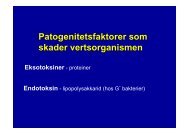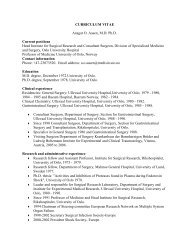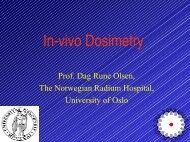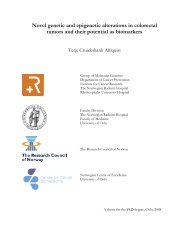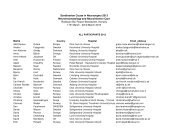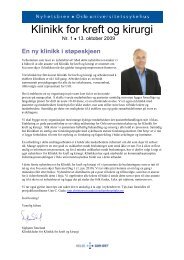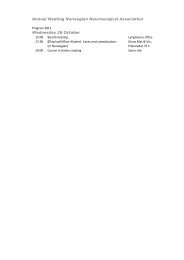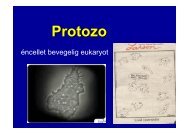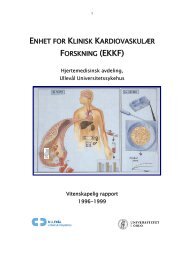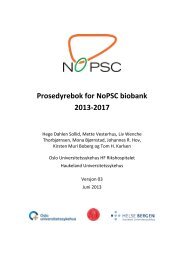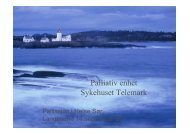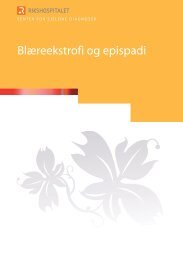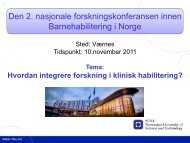Preface - Ous-research.no
Preface - Ous-research.no
Preface - Ous-research.no
Create successful ePaper yourself
Turn your PDF publications into a flip-book with our unique Google optimized e-Paper software.
Transplantation and Malignancy<br />
anti-cancer drugs, immu<strong>no</strong>suppressive drugs and small<br />
molecular compounds (Src-, PI3-, MEK and p38-kinase<br />
inhibitors) on TR cell function and effector T cell function.<br />
Compounds with a preferential, different or selective effect<br />
on either T cell subset, may point to important physiological<br />
differences in the intracellular signal transduction machinery<br />
with potential clinical value. Cell proliferation and<br />
intracellular cytokine production will be assessed by flow<br />
cytometry in CD4+ and CD8+ T cells.<br />
1.3 The physiological role of regulatory T cells and the<br />
mechanisms of action in interaction with effector T cells. In<br />
this in vitro project, we will aim to elucidate the physiologic<br />
role of regulatory T cells and the mechanisms of action in<br />
interaction with effector T cells. Regulatory T cells have been<br />
extensively studied for the last ten years. However, several<br />
fundamental questions remain unanswered. The molecular<br />
interactions underlying the immu<strong>no</strong>suppressive activity of<br />
regulatory T cells are <strong>no</strong>t k<strong>no</strong>wn. Furthermore, the temporal<br />
and cellular requirements of the immu<strong>no</strong>suppressive<br />
activity of the regulatory T cells during the cell-cell interaction<br />
with the effector T cells during an ongoing immune<br />
response, have <strong>no</strong>t been thoroughly dissected.<br />
We have been addressing several basal l properties of Treg<br />
function by seris of experiments studying the activation<br />
Requirements and Kinetic Properties of Human Regulatory<br />
T cells :<br />
Naturally occurring regulatory T (TR) cells are crucial in<br />
maintaining self tolerance by dominant suppression of<br />
potentially self-reactive T cells in peripheral tissues. The<br />
activation requirements, the temporal aspects of the suppressive<br />
activity and mode of action of human naturally<br />
occurring TR cells are subjects of great controversy. Ex vivo,<br />
TR cells display great variability in the suppressive activity<br />
dependent on do<strong>no</strong>r and experimental conditions. Here<br />
we show that by ex-vivo anti-CD3/anti-CD28 stimulation<br />
and subsequent fixation in paraformaldehyde, TR cells<br />
acquire full suppressive activity after 6 hours of stimulation.<br />
However, the activation requirements are heteroge<strong>no</strong>us as<br />
70% of healthy blood do<strong>no</strong>rs have fully suppressive TR cells<br />
without the need of ex-vivo stimulation. The suppressive<br />
activity of TR cells operates in a contact-dependent manner<br />
that is <strong>no</strong>t dependent on dendrittic cells or other antigenpresenting<br />
cells. The suppressive activity of paraformaldehyde<br />
fixated TR cells can be fully obliterated by trypsin<br />
treatment indicating that cytokine secretion is <strong>no</strong>t required<br />
for suppressive activity, but that a cell-surface protein is<br />
directly involved. By using inhibitors for downstream signaling<br />
pathways involved in T cell activation, we were <strong>no</strong>t able<br />
to inhibit the upregulation of TR cell mediated suppressive<br />
activity, indicating that this mechanism may be dependent<br />
on several pathways that operate in concert.<br />
These findings establishes a method for further studying a<br />
core suppressive mechanism in TR cells wich in turn could<br />
lead to therapeutically exploitable targets.<br />
Main Collaborators and Participating Institutions<br />
Karl Erik Giercksky, Prof, MD, PhD, Surgical Oncology<br />
Kjetil Taskén, Prof, MD, PhD, The Biotech<strong>no</strong>logy Centre of<br />
Oslo<br />
Gustav Gaudernack, Prof. MSc, PhD, Clinical Gene Therapy<br />
and Research<br />
Bjørn Naume Prof, MD, PhD, Dep. of Oncology<br />
Kirsten Muri Boberg, MD, PhD, Dep. of Internal Medicine<br />
Ivar P. Gladhaug Prof, MD, PhD, Division of Surgery<br />
Øystein Mathisen MD, PhD, Division of Surgery<br />
Stein Bergan, Prof, MSc, PhD, Dep. of Clinical Pharmacology<br />
Øystein Fodstad, Prof, MD, PhD, Dep. of Tumor Biology<br />
Gunhild M. Mælandsmo, Prof MD, PhD, Dep. of Tumor<br />
Biology<br />
Per O. Seglen, Prof, MD, PhD. Dep. of Cell Biology, Proteomics<br />
& Mammalian Cell Biology<br />
Jahn M Nesland, Prof., M.D., Ph.D. Micrometastasis Laboratory<br />
Gunnar Kvalheim, Prof, MD, PhD, Clinical Stem Cell Laboratory<br />
Halvdan Sørbye, Prof, MD, PhD Dep. of Oncology, UiB<br />
International Collaborators<br />
Professor Olle Korsgren, MD, PhD, Department of Immu<strong>no</strong>logy,<br />
Uppsala University Hospital, S.<br />
Professor Bo-Göran Ericzon, MD, PhD, Head of division<br />
Transplantation Surgery, Center for Surgical Sciences, Karolinska<br />
Institutet, StockholmUniversity, S.<br />
46



